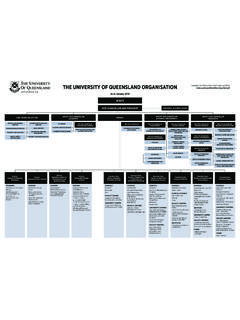Transcription of What Is Systems Engineering?
1 AC 2010-267: WHAT IS Systems Engineering? Jane Fraser, Colorado State University, PuebloJane M. Fraser is chair of the Department of engineering at Colorado State was formerly on the faculty at the Ohio State University and Purdue University. She has aBA in mathematics from Swarthmore College and MS and PhD in industrial engineering andoperations research from the University of California-Berkeley. Abhijit Gosavi, Missouri University of Science and TechnologyAbhijit Gosavi is an Assistant Professor at Missouri University of Science and Technology. Hewas formerly on the faculty at Colorado State University-Pueblo. His BS and MS is inMechanical engineering , and his in industrial engineering is from the University of SouthFlorida. American Society for engineering Education, 2010 What is Systems engineering ? Abstract ABET has recently proposed to expand its list of program criteria to include criteria for Systems and similarly named engineering programs.
2 Industrial engineers have often claimed the ownership of the phrase Systems engineering , even incorporating it into the names of some departments, , industrial and Systems engineering . While defining terms can be a sterile exercise, in this paper we concentrate on the practical implications of defining Systems engineering . Some of the questions we address here are as follows. What are the real-world problems that Systems engineering claims to study, what are the principal methods of Systems engineering and how different are they from those of industrial engineering , and what is and should be taught in programs in Systems engineering ? What can students expect to learn and what jobs can they obtain after completing their studies? Introduction With two recent actions, the industrial engineering community seems to have relinquished any exclusive claim on the use of the phrase Systems engineering . Those actions are (1) the vote by IIE membership to reject a proposal to add Systems to its name and (2) the determination that ABET s new criteria for Systems engineering programs will not apply to industrial and Systems engineering programs.
3 In December 2008, members of the Institute of Industrial engineering voted to retain the current name, rejecting the change to Institute of Industrial and Systems engineering . In a September 2008 article in Industrial Engineer, Editor Monica Elliott8 gave reasons for and against the change. As a point in favor of the change, she wrote: The education and practice of industrial engineering encompasses complex Systems , but other organizations are taking ownership of Systems activities that fall within our profession. As a point against the change, she wrote: The word ` Systems means a lot of things to a lot of people, which could bring about confusion and dilute instead of strengthen our identity. Many people think of computer and electrical Systems when they hear the word ` Systems in connection with engineering . After the vote rejecting the change, IIE Executive Director Don Greene commented:7 With this vote, the members have affirmed the breadth of industrial engineering .
4 Although our profession undoubtedly encompasses a Systems approach, it isn't necessary to communicate the broad reach that IE has through our name alone. Instead, industrial engineers around the world express who we are and what we do through our accomplishments. Particularly in our current economy, organizations are looking to industrial engineers to positively impact productivity and efficiency. Now is the time for IEs to step forward and make a difference. ABET has recently added program criteria for Systems and similarly named engineering programs (with lead agencies American Society of Mechanical Engineers, Institute of Electrical and Electronics Engineers, Institute of Industrial Engineers, ISA, International Council on Systems engineering , and SAE International). That document consists of the following two sentences: These program criteria apply to Systems engineering programs without modifiers in their title. There are no program-specific criteria beyond the General Criteria.
5 Together, the IIE vote and the ABET statement recognize that industrial engineering shares the phrase Systems engineering with other fields. This paper explores the various meanings of this phrase with the goal of helping academic departments in industrial engineering (whatever they are called) decide (1) how to use or not use the word Systems in describing industrial engineering and (2) what to teach students about Systems engineering . What can we learn from the other fields that use the phrase Systems engineering ? Meanings of Systems engineering When people use the phrase Systems engineering , they have in mind one of the following meanings: 1. The INCOSE definition, 2. A sub-field of electrical engineering , 3. A sub-field of industrial and Systems engineering , 4. A sub-field of engineering management or technology management, 5. The information technology definition, or 6. Systems engineering based on Systems theory. We now discuss each of these meanings.
6 1. INCOSE: According to INCOSE (International Council on Systems engineering ),13 Systems engineering is an interdisciplinary approach and a means to enable the realization of successful Systems . It focuses on defining customer needs and required functionality early in the development cycle, documenting requirements, then proceeding with design synthesis and system validation while considering the complete problem. Practitioners of system engineering in this meaning focus on one-time, large projects with a definite start and end, where a new system is to be designed and created to meet customer needs. Practitioners focus on industries such as information technology (IT), aerospace, and defense. On job posting sites ( , ), the phrase Systems engineering almost always describes a job in the INCOSE model, usually in the aerospace or defense industries. 2. Electrical engineering : Within the electrical engineering field, emphasis is attached to the use of Systems theory in applications, , spacecraft manufacture and management.
7 As such, Systems engineering within electrical engineering tends to emphasize control techniques which are often software-intensive. It appears that one of the first uses of Systems engineering was in Bell Managing complexity is an important ingredient of many courses taught within these programs. Modeling, simulation, reliability, and safety analysis of complex Systems are considered to be essential parts of the training needed for a successful Systems engineer. 3. Industrial and Systems engineering : This meaning is the hardest to pin down. Often the phrase industrial and Systems engineering is used interchangeably with industrial engineering . Industrial engineers create a new system or improve an existing system , The word system is meant to remind the IE of three key points which IEs emphasize more than other engineering disciplines: (1) components (including machines and people) interact with each other to create the overall behavior of the system ; (2) the system being studied is always a subsystem of a larger system and these interactions must also be considered; and (3) Systems include humans.
8 The word system is a caution against sub-optimization of the larger system through optimization of a subsystem. Because Industrial engineering academic departments often include a wide range of areas (physical and cognitive human factors, manufacturing processes, operations research, engineering management, etc.), the word Systems often appears to be an attempt to be inclusive. Also, some think that the word industrial doesn t include the full range of what industrial engineers do. Industrial and Systems engineering can apply to service companies, hospitals, insurance, etc. 4. Technology management or engineering management: In technology management, Systems engineering includes taking into consideration all aspects of the life cycle of the system . Thus the Systems engineering approach is said to account for manufacturability, installation, operations, maintenance, repair, and disposal of a system . When manufacturing or selling a product, a Systems engineer is likely to view the current technological phase of the product as a critical feature.
9 For instance, in the early 1990s, cell phones were in their early technological phases. Designing, manufacturing, and selling cell phones in those years were activities achieved with objectives and mechanisms that were different than those employed in the first decade of this century. A Systems engineer is acutely aware of this issue when considering every aspect of managing a business and designing a product. For managing a project, system engineering forces the manager to define the goals and objectives of the project. The project manager with an understanding of the Systems viewpoint is capable of knowing the difference between the long-term goals and short-term goals, and can focus on the long-term goals when making strategic decisions. Indeed, the issues of life cycle development are prominent within the literature on project management, and hence they have had an impact on Systems thinking by project managers. Another important focus of Systems in engineering is from the so-called perspective of engineering design.
10 In this setting, designing a complex system often requires an evaluation of different alternatives available to the designer. The Systems engineering approach is a framework that can provide data on the many disparate variables that lead to different alternatives and ultimately influence the choice of It is often said that the Systems viewpoint is also adopted when there are significant inter-related variables within the problem domain that need to be accounted for in a unified holistic approach. A mastery of mathematical, statistical, and quantitative techniques is expected of a Systems engineer in order to successfully design a product and manage a The design perspective of Systems engineering , also emphasized within engineering management, stresses the importance of measuring risks associated to a Decision analysis can then be used to make intelligent decisions with respect to choices. 5. Information technology: A new discipline has emerged in the business schools and computer science departments that goes by the name information Systems (which is often a minor in computer science departments) or management of information Systems (usually in business schools).

















